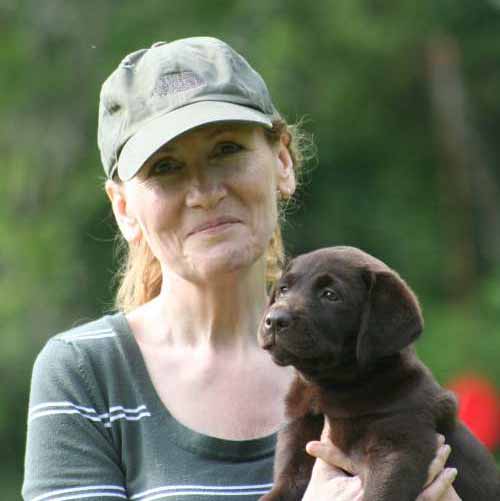Puppy socialization matters. And it might be more important than you think, not just for your dog, but for you too. It has the potential to have a major impact on you and your dog’s future happiness and safety.

My views, on puppy socialization have shifted back and forth a bit over the years. Sometimes, but not always, reflecting the views of the wider dog community. I’ll talk a bit about that shift of opinion in a moment.
Your window of opportunity
Socialization is a process of exposing puppies to new experiences, in a controlled way, so that they are comfortable with new experiences. And not afraid of all the surprises that life is likely to throw at them in the future.
The bulk of puppy socialization needs to take place during a developmental stage when puppies are especially open to those new experiences, and far less likely to be fearful of them, than they will be in the future.
This developmental stage is often referred to as the window for socialization. It only lasts a few weeks, closing when your puppy is around 13 or 14 weeks old. After that it takes much longer to socialize a puppy and your socialization efforts may not have such a good outcome.
This matters, because how well socialized your puppy is, will impact their temperament for life.
The socialization process
Socializing a puppy thoroughly involves taking them to a lot of new places. It means meeting a lot of new people, of different genders, and ages, and ethnicities.
It means introducing them to large noisy vehicles, riding on buses, exploring long grass, and sidewalks, malls, and cafes.
It’s quite a big deal, especially if you are not a very sociable person yourself. And it needs to be done in that rather small window of time.
Bad experiences
This socialization process of gentle introductions to our busy human world is just one part of the puppy’s environment. There are other, accidental life experiences that can influence your puppy’s temperament.
Being attacked by an aggressive dog, or being frightened by fireworks during this period are common experiences that can have long term harmful effects on a puppy.
So socialization isn’t just about purposefully exposing a puppy to beneficial experiences, it’s also about protecting your puppy from unwanted experiences.
Environment vs genetics
Of course, environment is only one part of the story. Genetics has an important part to play.
Some puppies are very easy to socialize. They take everything in their stride, embrace all new experiences with enthusiasm. And rush headlong into your world without a backward glance.
Their owners think socialization is easy, and wonder what all the fuss is about.
Other dogs inherit a very different temperament. They are naturally shy, more easily worried, more hesitant to explore. These puppies need a very dedicated and thorough approach to socialization.
Back in the day
When I was growing up in the 60s socialization was not yet a buzzword. In fact it was not a word that would be familiar to me for another twenty or more years. In those days, temperament was very much put down to genetics.
If you wanted friendly dogs, you bred from friendly dogs. And bad-tempered dogs were often quietly disappeared…
We all knew the odd farm dog or guard dog that had to be given a wide berth, but like kids in those day, most dogs were allowed out on the village streets to play with other dogs, and wander home when they were hungry. So in addition to some ‘genetic selection’, socialization kind of happened as part of life.
The modern puppy
Times change of course and many of us now lead more insular, and busier, lives.
Dogs are generally kept on their own properties and not allowed out to play in the street, and vaccinations protocols are now in place that cause some puppy owners to isolate their puppies until that all important window is closed.
Checkout this article – Is It Safe To Take My Puppy Out – for more information on finding a balance between keeping your puppy safe from infections, and getting them thoroughly socialized.
Modern homes are quieter during the day as most adults go out to work. So instead of happening more naturally as a part of family life, socialization tends to have to be a deliberate process that eats into people’s spare time and working hours.
Environment vs genetics
Temperament in dogs is no longer considered to be predominantly a result of genetics. We now know so much more about how socialization works and how important it is, than we did when I was growing up.
And in the last few decades the emphasis on this socialization process as being the over-riding factor in your puppy’s personality – for good or bad – has become firmly established.
This is where I part company slightly with mainstream opinion. And I do mean only slightly. I am overwhelmingly in favor of socializing puppies. But I suspect genetics plays a bigger part than is currently recognized. Lately I have seen and been made aware of, increasing numbers of dogs that have been well-socialized and yet are still fearful and nervous of one or more aspects of life.
We tend to refer to this fearfulness as reactivity. I know how challenging it can be to raise a reactive dog. And I believe that reactivity in dogs may be on the rise, and that the role of genetics in puppy temperament may have been downplayed a little too much.
Why reactivity should be more common, when more people than ever before know how to socialize their puppies, is a topic for another day. But I mention it because I think its only fair to say to new puppy parents that while your socialization efforts are very important and will offer your puppy the best chance of a happy future, they are not an absolute guarantee.
Should you be unfortunate enough to end up with a dog that has problems with reactivity, to any degree, it does not mean that you are at fault or that you did a poor job. It could just be really bad luck, and I’m sorry to say, bad genetics.
The fact is, genetics and environment both play their part. And while socialization cannot give you a 100% guarantee. I can guarantee that without it, you and your puppy will likely run into problems in the future.
So it has to be done, and done soon. And the benefits for your dog are clear
- Safety
- Friendliness
- Confidence
- Relaxation
Without socialization, fear and ultimately aggression could be what your dog has to look forward to.
It’s not nice for your dog to feel afraid. But the implications of fear go beyond your dog’s comfort and happiness.
Where Fear Can Lead
If your dog hides behind you when the doorbell goes, that’s sad or even a little embarrassing for you as their owner, but fear can lead to aggression, and is the most common reason for dogs to bite.
Fear aggression can lead to a life of restraints, changed plans, upset and attempts at behavioral training that may or may not be successful. For many dogs, it lands them in and out of shelters as various homes attempt or fail to help. And for some dogs, sadly the ultimate end is euthanasia. The thought of which was a million miles away from that original owner when their vulnerable eight week old puppy arrived home.
Safety
Socialization is ultimately about safety. Your safety and the safety of others. It’s about making your dog safe to be around. Safe for the puppy that runs up to them. Safe to take into your friend’s home. Safe for a child to pat.
It’s also about making your dog safe from the some of the outcomes that often await nervous or fearful dogs if ever their original owner is unable to take care of them. Safe from being abandoned, safe from being passed from home to home. Safe from being considered ‘too much of a risk’ to rehome again.
Well socialized adult dogs are confident and trusting. They can go anywhere, meet anyone, and take everything in their stride. You can take your well socialized dog to cafes, to your friend’s homes, on vacations, without worrying about how they will cope. And because they are relaxed, they are more relaxing to be around.
Confident, trusting dogs are friendlier. And every single family dog should be a friendly dog. One that will welcome guests of any age into the home, and who will accept an unexpected pat on the head by a stranger at the dog park with a wagging tail and a happy face.
For all these reasons, socialization matters very much.
And if you need any help with this process, do drop into the Facebook Group for support and information.

Free Training Tips
Get Pippa's free dog training tips delivered to your inbox

 How To Get Your Dog To Behave Nicely Around Other Animals
How To Get Your Dog To Behave Nicely Around Other Animals